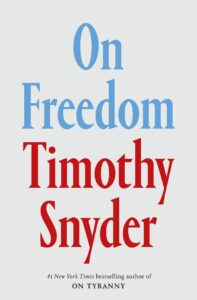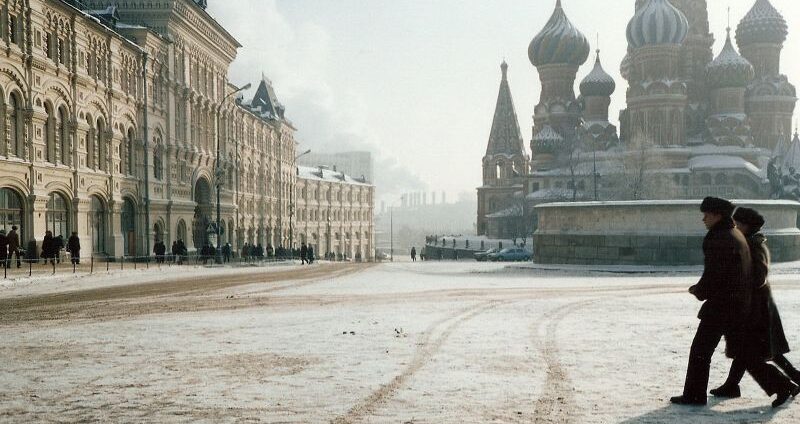In the language of physics, a bell that hangs on a post on a farm is in equilibrium: the force of gravity pulling it down is matched by the force of the ground pushing back on the structure. Getting a bell in the air so that it can be rung requires some careful work. Not every equilibrium is the same. The Tsar Bell is in an equilibrium in which it cannot be rung.
Article continues after advertisement
Economists also speak of equilibria. They like situations when things seem to be in balance, as the result of an aggregate of human actions that can be characterized as a larger, impersonal force. For example: supply, the amount of stuff, is supposed to balance demand, how much people want that stuff. An equilibrium is like a happy ending: everything turns out right. We don’t have to think about people as individuals with purposes: markets do the thinking for us. We do not have to ask how people come into the world, why they want what they want, or what it means to be free.
Any shift to capitalism in the Soviet Union had to be understood as part of a longer political history.
In autumn 1990, when I traveled to the Soviet Union, I was working on projects in economics, but that semester I was also taking graduate classes in history and had applied for a fellowship to continue those studies in a doctoral program. I liked history’s inexhaustibility—a surprise awaited in each new book, behind each half-understood event, within each new language. The past is full of wild possibilities that were actually realized, such as the Bolshevik Revolution, or the American one. The east European revolutions of 1989, unpredictable as they had been, made me wonder whether other surprises might be coming.
In Moscow in November 1990, history gave me a common language with Soviet scholars. We talked about the Russian economy in the late imperial years, before the revolution, and about the crash industrialization of the 1930s. I could agree with Soviet participants that the problem of transforming their planned economy into something else was not foreseen in textbook economics.
In the cold and drafty conference room, my mind wandering, I doodled little bells in the margins of my notes. In the Russian Empire, in 1591 and 1771, bells had been sentenced to Siberian exile, on the theory that they precipitated public gatherings. In 1510, after Moscow conquered the town of Pskov, the new rulers did away with the bell used to call public meetings.
I drew some manacles around the bells. In the Soviet Union, as I knew from my own research on Soviet monopoly, Pskov was where they made all the handcuffs. (In 2014 troops from Pskov invaded Ukraine; in 2022 they murdered civilians at Bucha.) The rest of the Soviet economy was similarly centralized: critical products were made in a few sites or even in a single factory. Natural gas and oil were also extracted and distributed in a very centralized way.
As an initial condition for a market economy, I was trying to say, monopoly was unpromising. Capitalism’s radical critics (Vladimir Lenin) and radical supporters (Friedrich Hayek) agreed that monopoly meant oppression. Markets are supposed to enable competition, spread information, and separate economics from politics. But what would happen when giant Soviet enterprises came into private hands?
Monopolists would seek to prevent competition, own media, and corner political power. Once the Soviet Union began to come apart (I was arguing), its industrial concentration would accelerate the process of disintegration, because locals who seized control of valuable assets would seek to protect their new holdings by trying to control new states.
As the Soviet Union came to an end, American anxiety yielded to an odd euphoria.
So any shift to capitalism in the Soviet Union had to be understood as part of a longer political history, not as a clearing of the slate that would generate perfect markets. From the starting point of the Soviet reality around me in November 1990, laissez-faire was not going to lead to the right result. Oligarchy, rule by the very wealthy, is also an equilibrium. A heavy bell can just stay on the ground.
I don’t think I managed to get much of this across in Moscow: the huge meeting room turned all utterances into echoes; men in scarves shivered during the presentations; the secondhand cigarette smoke was uncannily warmer than the air.
No one was thinking much then about the non-Russian nations. Americans said “Russia” for the USSR and “Russians” for Soviet citizens. I was little better, though I knew the geography from studying military sites and big factories. Half of the population of the Soviet Union was not Russian, and a quarter of the territory was in the non-Russian republics. The Russian republic itself was described as a federation because of its tremendous variety: it contained, for example, the Tatars, one of the largest Soviet nationalities. Ukraine was, after Russia, the second-largest in population. In Moscow, American conference participants saw the opera Mazepa, about the Ukrainian hetman and his break with Tsar Peter; during the intermission, the economists in the group asked the Russia hands whether Ukraine was a separate country. Not really, was the consensus.
Jet-lagged and reading at night for a college seminar on Marxism, I thought in Moscow about the uncanny similarity between the prophets of communism and the prophets of capitalism. Capitalists knew that communist societies would automatically right themselves once private property was restored, just as Marxists had once known that capitalist societies would automatically right themselves once private property was abolished. I felt the draw of the first view: Would it not be nice to simply start again, free of the past? But the appeal was just too similar to the confidence of Marx and Engels, or for that matter that of Lenin and Trotsky when the Soviet experiment began.
I worked as a student at the Center for Foreign Policy Development between spring 1989 and spring 1991, in Washington at Foreign Policy magazine in summer 1990, and in Washington again at the Institute for International Economics in the summer and autumn of 1991. I had a sense of the elite consensus between the end of communism in eastern Europe in late 1989 and the disintegration of the Soviet Union in late 1991. Very few of the wise heads expected either. The George H.W. Bush administration supported Gorbachev to the very last moment. U.S. policy was to hold the Soviet Union together. President Bush went to Kyiv on August 1, 1991, but only to urge Ukrainians not to declare independence.
On August 18, 1991, I went to bed early in my Georgetown sublet. I had worked all day on Russian economics and German language, then made a meal for some friends to celebrate my twenty-second birthday. A Russian friend awakened me with a telephone call: “Massive revolution!” He meant the coup attempt against Gorbachev that would be the beginning of the end of the USSR. Ukrainian communists declared the independence of their republic on August 24. A month later, I finished my study of Soviet monopoly and departed for graduate study in history at Oxford. The formal dissolution of the USSR in December found me in Czechoslovakia. Right after New Year’s, I took the night train from Prague to Warsaw. When I presented a paper on Soviet monopoly in Vienna in April 1992, the economists from what had been the USSR now represented newly independent states.
As the Soviet Union came to an end, American anxiety yielded to an odd euphoria. Americans hadn’t expected revolution and disintegration. And yet many were now speaking with confidence about what must follow: a durable capitalist equilibrium would bring with it democracy and freedom. In fairness, the better economists were concerned about structures. But negative freedom set the tone: once the barriers of Soviet central planning and state ownership were cleared away, only good things could follow. This odd confidence about the future was one reason I decided to study the past.
__________________________________

Excerpted from On Freedom by Timothy Snyder. Copyright © 2024 by Timothy Snyder. Published in the United States by Crown, an imprint of the Crown Publishing Group, a division of Penguin Random House LLC.

